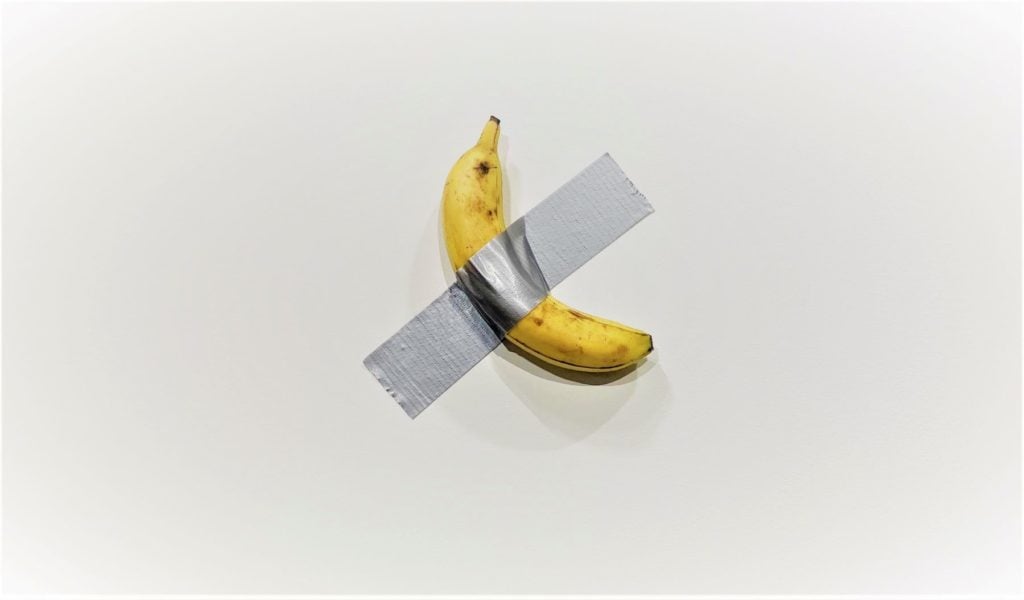Art World
The Performance Artist Who Vandalized Maurizio Cattelan’s Banana Booth at Art Basel Will Not Face Legal Repercussions
He didn't even have to go to a-peels court.

He didn't even have to go to a-peels court.

Caroline Goldstein

The Massachusetts-based artist Rod Webber has been cleared of criminal charges stemming from his alleged vandalism at Art Basel in December 2019.
His antics centered around Maurizio Cattelan’s artwork Comedian (2019), which consisted of a single, perfectly ripened yellow banana duct-taped to Perrotin gallery’s booth wall. The instantly infamous work was on sale for a whopping $120,000. It caused a frenzy, with visitors gawking and snapping selfies, whilst bemoaning the outrageous price tag and drawing comparison’s to Marcel Duchamp’s readymade urinal.
Another performance artist, David Datuna, had decided to capitalize on the ruckus and ate the banana off the wall. After that, Webber stepped in to grab his own 15 minutes of fame, scrawling “EPSTIEN [sic] DIDNT KILL HIMSELF” on the now empty wall in red lipstick (a reference to conspiracy theories surrounding disgraced financier Jeffrey Epstein’s suicide).
When Basel security guards were called over, Webber quipped that “this is the gallery where everyone can do art.” He was detained nonetheless. At the time, Perrotin representatives said they were not interested in pressing charges, but the state of Miami filed charges of criminal mischief anyway.
At a court date on Wednesday, Webber was cleared of the charges in large part because Art Basel declined to participate in the court proceedings, letting the lipstick vandal off the hook. Speaking to media outlets after the hearing, the artist told reporters, “I think this is a big victory for art…they can’t decide what art is.”
The #ArtBasel / #DuckTapeBanana/ #EpsteinDidntKillHimself case has been dismissed. They had nothing because I did nothing wrong… unlike Mr. Epstein. I hope that one day his victims can find a more meaningful victory than this. pic.twitter.com/F4jEMzKMiX
— Rod Webber (@RodWebber) February 27, 2020
In a post on his personal website, Webber wrote that he was disappointed that neither Perrotin, original banana-eater David Datuna, nor Art Basel had replied directly to his messages about the action.
He summarized the Florida state statute for criminal mischief, which outlines the basis for such a charge “if he or she willfully and maliciously injures or damages by any means any real or personal property belonging to another… including the placement of graffiti or other acts of vandalism.”
Webber argued that if Datuna’s act can be designated as an artwork, his should be viewed in the same way. The state was treading a slippery slope, he continued, by violating his first amendment rights to freedom of expression; he described the “thought police” that would render ideas invalid in a dystopian society, referencing George Orwell’s 1984, that favorite text of disaffected high-school students around the world. Webber also asked readers to consider the recent 5Pointz graffiti case as an example of artists’ rights superseding those with commercial interests.